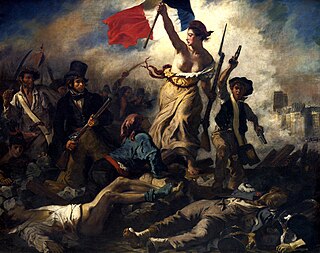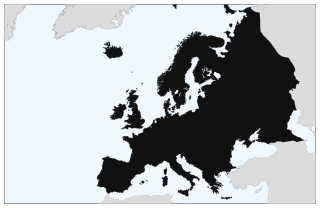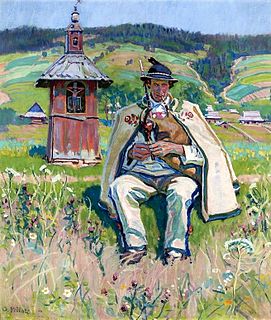
Romantic nationalism is the form of nationalism in which the state derives its political legitimacy as an organic consequence of the unity of those it governs. This includes, depending on the particular manner of practice, the language, race, ethnicity, culture, religion, and customs of the nation in its primal sense of those who were born within its culture. It can be applied to ethnic nationalism as well as civic nationalism. Romantic nationalism arose in reaction to dynastic or imperial hegemony, which assessed the legitimacy of the state from the top down, emanating from a monarch or other authority, which justified its existence. Such downward-radiating power might ultimately derive from a god or gods (see the divine right of kings and the Mandate of Heaven).
In geography, regions are areas that are broadly divided by physical characteristics, human impact characteristics, and the interaction of humanity and the environment. Geographic regions and sub-regions are mostly described by their imprecisely defined, and sometimes transitory boundaries, except in human geography, where jurisdiction areas such as national borders are defined in law.

A landscape is the visible features of an area of land, its landforms, and how they integrate with natural or man-made features. A landscape includes the physical elements of geophysically defined landforms such as (ice-capped) mountains, hills, water bodies such as rivers, lakes, ponds and the sea, living elements of land cover including indigenous vegetation, human elements including different forms of land use, buildings, and structures, and transitory elements such as lighting and weather conditions. Combining both their physical origins and the cultural overlay of human presence, often created over millennia, landscapes reflect a living synthesis of people and place that is vital to local and national identity.
Borders are geographic boundaries of political entities or legal jurisdictions, such as governments, sovereign states, federated states, and other subnational entities. Borders are established through agreements between political or social entities that control those areas; the creation of these agreements is called boundary delimitation.
In politics, regionalism is a political ideology focusing on the "development of a political or social system based on one or more" regions and/or the national, normative or economic interests of a specific region, group of regions or another subnational entity, gaining strength from or aiming to strengthen the "consciousness of and loyalty to a distinct region with a homogeneous population", similarly to nationalism. More specifically, "regionalism refers to three distinct elements: movements demanding territorial autonomy within unitary states; the organization of the central state on a regional basis for the delivery of its policies including regional development policies; political decentralization and regional autonomy".
The Scottish Renaissance was a mainly literary movement of the early to mid-20th century that can be seen as the Scottish version of modernism. It is sometimes referred to as the Scottish literary renaissance, although its influence went beyond literature into music, visual arts, and politics. The writers and artists of the Scottish Renaissance displayed a profound interest in both modern philosophy and technology, as well as incorporating folk influences, and a strong concern for the fate of Scotland's declining languages.
Young Judaea is a peer-led Zionist youth movement that runs programs throughout the United States for Jewish youth in grades 2–12. In Hebrew, Young Judaea is called Yehuda Hatzair or is sometimes referred to as Hashachar (השחר), lit. "the dawn". Founded in 1909, it is the oldest Zionist youth movement in the United States.

The culture of Europe is rooted in the art, architecture, film, different types of music, economic, literature, and philosophy that originated from the continent of Europe. European culture is largely rooted in what is often referred to as its "common cultural heritage".

In anthropology and geography, a cultural region, cultural sphere, cultural area or culture area refers to a geography with one relatively homogeneous human activity or complex of activities (culture). Such activities are often associated with an ethnolinguistic group and with the territory it inhabits. Specific cultures often do not limit their geographic coverage to the borders of a nation state, or to smaller subdivisions of a state. Cultural "spheres of influence" may also overlap or form concentric structures of macrocultures encompassing smaller local cultures. Different boundaries may also be drawn depending on the particular aspect of interest, such as religion and folklore vs. dress and architecture vs. language.

Cultural geography is a subfield within human geography. Though the first traces of the study of different nations and cultures on Earth can be dated back to ancient geographers such as Ptolemy or Strabo, cultural geography as academic study firstly emerged as an alternative to the environmental determinist theories of the early 20th century, which had believed that people and societies are controlled by the environment in which they develop. Rather than studying pre-determined regions based upon environmental classifications, cultural geography became interested in cultural landscapes. This was led by the "father of cultural geography" Carl O. Sauer of the University of California, Berkeley. As a result, cultural geography was long dominated by American writers.

The Gorals are an ethnographic group primarily found in their traditional area of southern Poland, northern Slovakia, and in the region of Cieszyn Silesia in the Czech Republic. There is also a significant Goral diaspora in the area of Bukovina in western Ukraine and in northern Romania, as well as in Chicago, the seat of the Polish Highlanders Alliance of North America.
American modernism, much like the modernism movement in general, is a trend of philosophical thought arising from the widespread changes in culture and society in the age of modernity. American modernism is an artistic and cultural movement in the United States beginning at the turn of the 20th century, with a core period between World War I and World War II. Like its European counterpart, American modernism stemmed from a rejection of Enlightenment thinking, seeking to better represent reality in a new, more industrialized world.
In international relations, regionalism is the expression of a common sense of identity and purpose combined with the creation and implementation of institutions that express a particular identity and shape collective action within a geographical region. Regionalism is one of the three constituents of the international commercial system.
Latin American culture is the formal or informal expression of the people of Latin America and includes both high culture and popular culture, as well as religion and other customary practices. These are generally of Western origin, but have various degrees of Native American, African and Asian influence.

Both the perceived nationhood of Spain, and the perceived distinctions between different parts of its territory are said to derive from historical, geographical, linguistic, economic, political, ethnic and social factors.

Oren Yiftachel is an Israeli professor of political and legal geography, urban studies and urban planning at Ben-Gurion University of the Negev, in Beersheba. He holds the Lynn and Lloyd Hurst Family Chair in Urban Studies.

Italian modern and contemporary architecture refers to architecture in Italy during the 20th and 21st centuries.

The setting is particularly important in regional literature. In literature regionalism refers to fiction or poetry that focuses on specific features, such as dialect, customs, history, and landscape, of a particular region : "Such a locale is likely to be rural and/or provincial."
A novelist is an author or writer of novels, though often novelists also write in other genres of both fiction and non-fiction. Some novelists are professional novelists, thus make a living writing novels and other fiction, while others aspire to support themselves in this way or write as an avocation. Most novelists struggle to have their debut novel published, but once published they often continue to be published, although very few become literary celebrities, thus gaining prestige or a considerable income from their work.
Uyghur nationalism is a form of nationalism which asserts that the Uyghur people, an ethnic minority in China, are a distinct nation. Uyghur nationalism promotes the cultural unity of the Uyghur people, either as an independent group or as a regional group within a larger Chinese nation.









